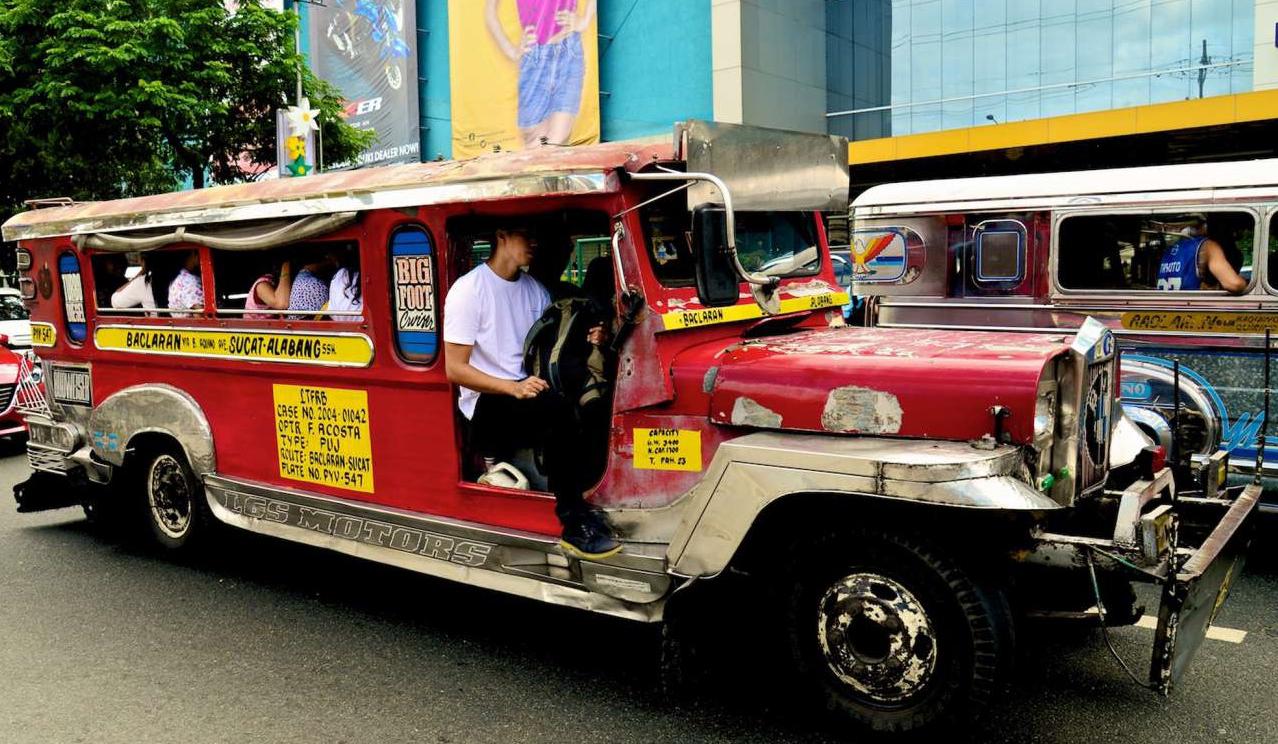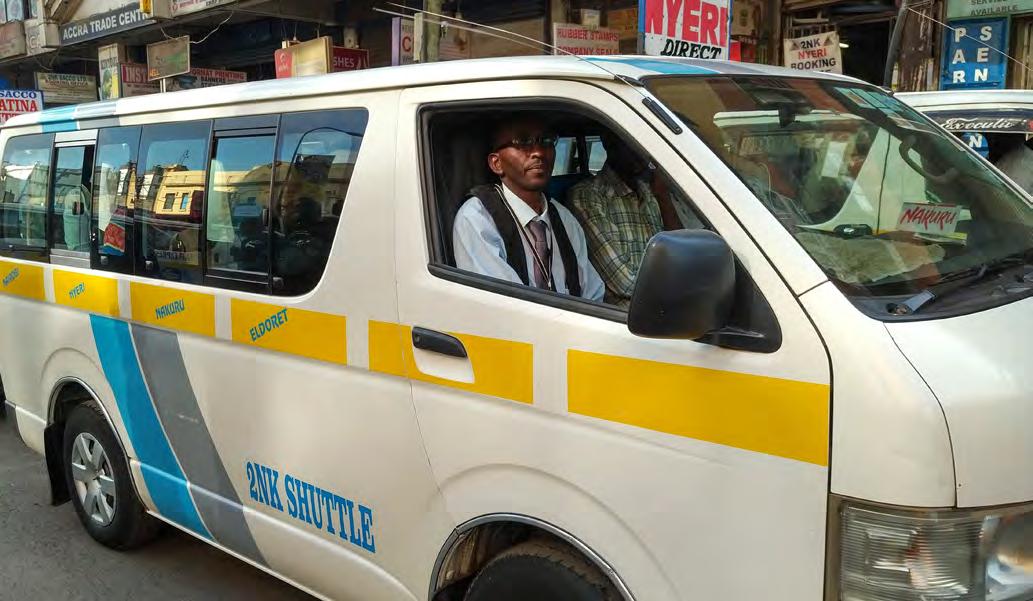
9 minute read
What is our agenda?
provide regulated access to public space – essential for informal workers in transport terminals and service workers (mechanics, vendors etc)
Although ILO recommendations have no legal power, this framework provides powerful political and ethical arguments in negotiations with national and international authorities. Some national governments have started to address formalisation – for example, the Senegalese government has established a new position of minister of the transformation of the informal sector, which potentially provides a space for unions to negotiate.
Governments borrowing from IFIs like the World Bank to finance their urban transport reform projects are legally bound to engage with stakeholders affected by projects, as a result of the binding environmental and social safeguards adopted by many IFIs.17
The World Bank 2018 Environmental and Social Framework requires borrowers (governments) to actively engage with those affected by the project in both the design and implementation phase. The framework also contains provisions that require borrowers to address the economic displacement – the impact on livelihoods – brought about by project implementation.
While IFI safeguarding systems are lacking in many respects, especially concerning gender protection, they may offer unions another strategic argument to shape urban transport reform.
ATGWU organiser recruiting boda boda drivers
REALISING THE RIGHT TO COLLECTIVE BARGAINING
First and foremost, without the power of strong union organisation it will be impossible to successfully reform and formalise urban passenger transport to the benefit of transport workers and passengers.
This includes the inclusion of informal workers within the trade union movement as members and leaders, and changes to our constitutions, organising methods, services and internal organisation to become relevant and effective in the informal transport industry. ITF affiliates are proving that this is possible and becoming more powerful as a result18 .
With this collective power, we can begin to realise our rights to collective bargaining.
This firstly requires recognition that collective bargaining is not just between employers and employees, but between workers and any organisation or institution that has power and influence over our livelihoods and working conditions, including governments and transport authorities. It includes both those who are informally employed and self-employed. It includes all those who are part of the transport industry, not just drivers and riders. It includes both women and men.
Collective bargaining requires the identification of the bargaining counterpart (the people we need to negotiate with to effect change), their recognition that we are the legitimate democratic representatives of the workforce, and an agreement on how, where and when collective bargaining can take place – a negotiating platform.
It is essential that unions are recognised to have negotiation rights as key stakeholders, not just vague references to consultation or information-sharing.
It also requires that our members be fully informed and involved in democratically determining demands and reaching
agreements, supported where necessary by education and training programmes. Women and young transport workers must be represented on all decision-making bodies to make sure that their concerns are reflected in the policies, strategies and demands of our organisations.
Gaining recognition and agreement can be difficult, and may require sustained campaigning, lobbying, and where possible and necessary, industrial action. But it can be done, and there are signs that some authorities are increasingly aware that attempts to reform the transport system cannot be achieved against the opposition of the workforce, and that they need to find a platform for negotiations as much as we do.
UNDERSTANDING THE INFORMAL TRANSPORT ECONOMY
It is evident that very few governments or transport authorities fully understand how the informal economy works in practice. Many regard it as unregulated and chaotic, dominated by criminality and corruption and essentially unreformable. They have little idea – or show little interest in – how many workers are involved, how they make a living or how they are organised. Yet it is impossible to reform the industry if planners and regulators do not know how it works in the first place.
The workers themselves have a deep and detailed knowledge of how their industry operates: the ‘market structure of paratransit’, as transport economists would describe it.
Trade unions and their allied workers’ associations in informal transport have an opportunity to give voice to their members, to explain and analyse how the informal transport economy works in practice on the streets – for example, who pays who to do what, who owns the vehicles, who organises the routes and who controls the terminals. Most importantly, workers’ organisations can draw on practical experience to identify what needs to change if the industry is to move towards economic and environmental sustainability through a process of formalisation.
In recent years, ITF affiliates in some African cities have begun to work alongside researchers to build a detailed picture of their transport system through the eyes of the workers themselves, and to assess the potential impact of major infrastructure projects – particularly BRT – on the workforce. These initiatives, in Nairobi, Dakar and Kampala, have produced detailed analyses of the informal transport industry from a workers’ perspective.
The subsequent published reports have provided the unions with new tools in demanding negotiations with government on reform of the sector and have also provided the authorities and financial institutions with a new perspective on the potential role of unions and associations in the formalisation process.
REFORM FROM BELOW
Until now, the strategy of governments, transport planners and financial institutions has concentrated on large-scale, capital-intensive infrastructure projects that would sweep aside informal services. Little or no attention has been given to the impact of these projects on the livelihoods or rights of the informal workforce.
In the global South, these have been dominated by BRT projects, which have largely failed. There are inherent structural reasons for these failures, such as the lack of government subsidy and reliance on market solutions; the opposition of the informal workforce whose livelihoods were threatened; and opposition from powerful forces (police, military, politicians etc) with interests in the traditional industry as vehicle owners, moneylenders and beneficiaries from bribery and extortion.
There is increasing awareness among transport planners and professionals that a top-down approach to urban transport reform will not work. Rather than imposing expensive new unviable infrastructure that saddles the government with debt, the strategy should build from below. By working with the informal workforce, it is possible to identify practical incremental steps towards a formalised transport system that is efficient, affordable and environmentally sustainable – yet labour intensive with decent working conditions.
Much of this will not require huge financial investment, but rather will be implemented through regulation and inclusive planning
Jeepney in the Philippines

negotiated with democratically accountable unions and allied associations.
The central feature of such reform must be to remove the target system and replace it with employment based on contracts and regular wages. This would remove competition on the streets and the dangerous and exploitative extreme working hours. It would reduce accidents and fatalities. It would open the way towards scheduled services and better reliability for passengers, rather than the current ‘fill and run’ system. With reduced working hours and better vehicles, it could also cut the numbers of vehicles and reduce emissions.
To remove the damaging target system and to reorientate the whole urban transport industry towards the goal of quality public transport for workers and passengers fundamentally requires the reform of vehicle ownership. In many cities, fleets of vehicles are owned by powerful interests that remain hidden behind a complex system of proxies and agents. Most so-called owners’ associations are represented by intermediaries, small owners or would-be entrepreneurs seeking business opportunities. The real owners take little responsibility and no risk – their sole concern is the daily or weekly target payments collected on their behalf by the agents on the streets. We need to explore alternative models of ownership. Depending on local circumstances, this could include workers’ cooperatives, cooperatives of owner-drivers, or registered and regulated privately-owned companies. Or trade unions themselves.
Ultimately, of course, public transport should be publicly owned, as much of it used to be, including bus companies in the global South. The ITF’s global demand for the sector is that public transport services must be publicly owned and operated, with guaranteed democratic accountability. In many countries, workers question state ownership, due to the levels of political corruption and public debt. But public ownership does not necessarily imply state ownership. Some unions are developing proposals for other forms of public ownership, like worker cooperatives, in the reform of informal passenger transport.
Public transport reform and formalisation also requires the removal of corruption and extortion, which is endemic throughout the informal transport industry. Informal (and many formal) transport union and association members throughout the world report routine police corruption and bribery on such a scale that it has a severe impact on livelihoods. Political corruption constantly undermines
efforts to build strong and democratic workers’ organisations, with, for example, politicians paying large sums to leaders in exchange for votes.
At present, the informal transport workforce is overwhelmingly dominated by men, although there are some small signs of more women entering the industry. Any reform and formalisation process must include action for gender equality. This requires a complete dismantling of gender-based occupational segregation, where women are often restricted to the most precarious and low paid jobs in transport and excluded from training opportunities and better paid jobs such as drivers, mechanics or conductors. It requires an end to gender-based violence and harassment in the industry, where demands for sexual favours in return for employment are common.
After Covid-19, we cannot go back to a ‘normal’ which for many women transport workers means being overrepresented in precarious employment without social protections, underrepresented in leadership and decision making, facing violence at work and home, and sanitation indignity. This is not normal. Instead, we have an opportunity to ensure that as we emerge from this crisis, that there is a ‘gender equal new normal’ that guarantees good jobs for all workers.’
ITF. 2020. Women Transport Workers’ Rights and Covid-19
While the pandemic has exposed the extreme vulnerability of informal transport workers to the lack of social protection, it has also highlighted the importance of workers’ welfare funds, cooperatives and savings and credit cooperative societies (SACCOs), not just as crucial safety nets for survival, but potentially as worker-controlled companies with the capability of owning vehicles and employing workers with contracts, regular wages and basic social protection.
Many welfare funds and SACCOs for transport workers are known to be very weak, poorly managed and lacking in real democratic accountability to their members. They are also vulnerable to manipulation by politicians and exploitation by cartels and powerful business interests.
Nevertheless, with support and investment, they may offer an important potential starting point for worker-led formalisation.








